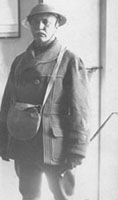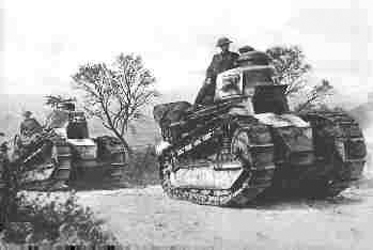Samuel D. Rockenbach
Le Colonel Dickersin Rockenbach est né le 27 janvier 1869 à Lynchburg (Virginie) deviendra célèbre en devenant le commandant de l'US Tank Corps durant la 1re guerre mondiale. Il fut gradué au Virginia Military Institute en 1889 et entra dans l'US Army avec le grade de second Lieutenant en 1891. Avant la première guerre mondiale, il fut envoyé dans divers postes militaires à Cuba et aux Philippines. En 1914, il est observateur militaire en Allemagne.
Colonel Dickersin Rockenbach was born on January 27, 1869 at Lynchburg (Virginia) will become famous while becoming the commander of US Tank Corps during the 1st world war. It was graduated in Virginia Military Institute in 1889 and entered into US Army with the rank of second Lieutenant in 1891. Before the First World War, it was sent in various military stations in Cuba and Philippines. In 1914, he is military observer in Germany.
 |
src: VMI
Archives
|
Rockenbach débarqua en France en juin 1917 avec l'American Expeditionary Force du Général Pershing. De 1917 à 1919, il occupa le poste de commandant du Tank Corps américain nouvellement formé. Son travail dans la formation de ce nouvelle arme et dans le développement de la guerre des chars sera reconnue par tous.
Rockenbach landed in France in June 1917 with American Expeditionary Force of the P General ershing. From 1917 to 1919, it occupied the post of commander of the American Tank Corps lately formed. Its work in the formation of this new weapon and in the development of the tank warfare will be recognized by all.
 |
US Tank Corps Renault FT's
in action |
src: Doughboy
Center
|
A la fin de la 1re guerre mondiale il continuera son travail sur le développement des chars en tant chef du Tank Corps et après la dissolution de celui-ci comme directeur de l'école des blindés de Camp Meade (Maryland). Après la fin de sa carrière militaire en 1933, il vivra à Brownsville (Texas). Il décéda en 1952 au Walter Reed Army Hospital de Washington DC.
At the end of the 1st world war he will continue its work on the development of the tanks as chief of the Corps and after the dissolution of this one as as director of Tank school of Camp Meade (Maryland). After the end of its military career in 1933, he will live in Brownsville (Texas). He died in 1952 in the Walter Reed Army Hospital of Washington DC.
 |
Mark V Male |
src: Great
Britain Tanks
|